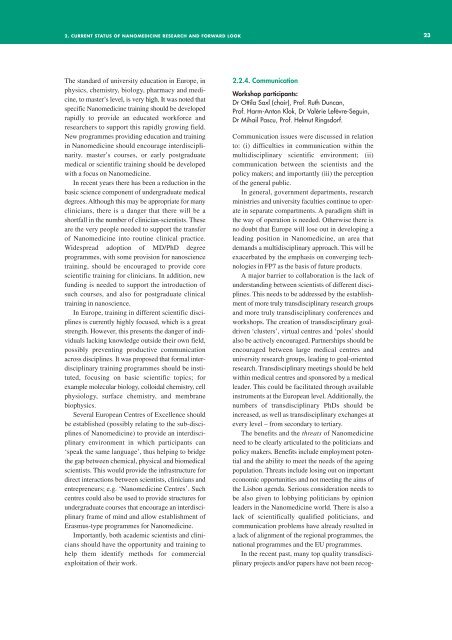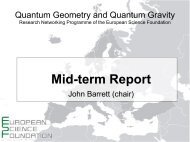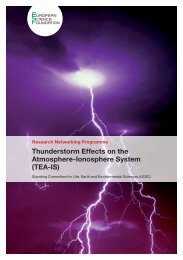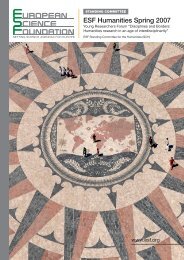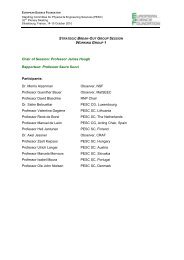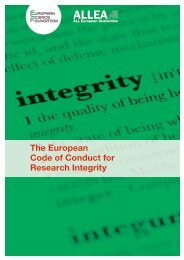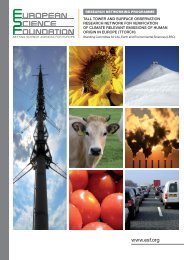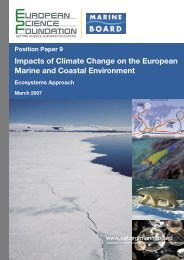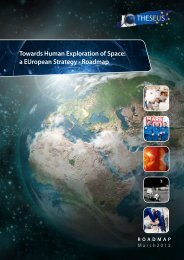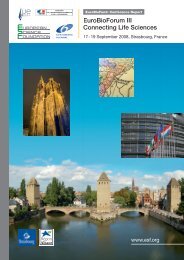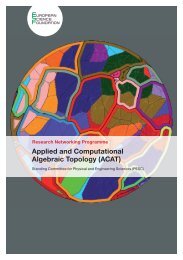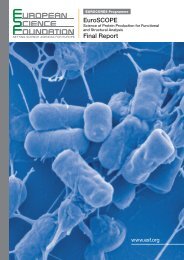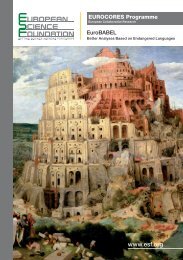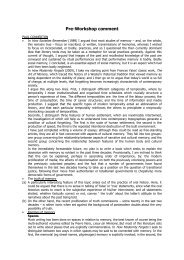Nanomedicine - European Science Foundation
Nanomedicine - European Science Foundation
Nanomedicine - European Science Foundation
Create successful ePaper yourself
Turn your PDF publications into a flip-book with our unique Google optimized e-Paper software.
2. CURRENT STATUS OF NANOMEDICINE RESEARCH AND FORWARD LOOK 23<br />
The standard of university education in Europe, in<br />
physics, chemistry, biology, pharmacy and medicine,<br />
to master’s level, is very high. It was noted that<br />
specific <strong>Nanomedicine</strong> training should be developed<br />
rapidly to provide an educated workforce and<br />
researchers to support this rapidly growing field.<br />
New programmes providing education and training<br />
in <strong>Nanomedicine</strong> should encourage interdisciplinarity.<br />
master’s courses, or early postgraduate<br />
medical or scientific training should be developed<br />
with a focus on <strong>Nanomedicine</strong>.<br />
In recent years there has been a reduction in the<br />
basic science component of undergraduate medical<br />
degrees. Although this may be appropriate for many<br />
clinicians, there is a danger that there will be a<br />
shortfall in the number of clinician-scientists. These<br />
are the very people needed to support the transfer<br />
of <strong>Nanomedicine</strong> into routine clinical practice.<br />
Widespread adoption of MD/PhD degree<br />
programmes, with some provision for nanoscience<br />
training, should be encouraged to provide core<br />
scientific training for clinicians. In addition, new<br />
funding is needed to support the introduction of<br />
such courses, and also for postgraduate clinical<br />
training in nanoscience.<br />
In Europe, training in different scientific disciplines<br />
is currently highly focused, which is a great<br />
strength. However, this presents the danger of individuals<br />
lacking knowledge outside their own field,<br />
possibly preventing productive communication<br />
across disciplines. It was proposed that formal interdisciplinary<br />
training programmes should be instituted,<br />
focusing on basic scientific topics; for<br />
example molecular biology, colloidal chemistry, cell<br />
physiology, surface chemistry, and membrane<br />
biophysics.<br />
Several <strong>European</strong> Centres of Excellence should<br />
be established (possibly relating to the sub-disciplines<br />
of <strong>Nanomedicine</strong>) to provide an interdisciplinary<br />
environment in which participants can<br />
‘speak the same language’, thus helping to bridge<br />
the gap between chemical, physical and biomedical<br />
scientists. This would provide the infrastructure for<br />
direct interactions between scientists, clinicians and<br />
entrepreneurs; e.g. ‘<strong>Nanomedicine</strong> Centres’. Such<br />
centres could also be used to provide structures for<br />
undergraduate courses that encourage an interdisciplinary<br />
frame of mind and allow establishment of<br />
Erasmus-type programmes for <strong>Nanomedicine</strong>.<br />
Importantly, both academic scientists and clinicians<br />
should have the opportunity and training to<br />
help them identify methods for commercial<br />
exploitation of their work.<br />
2.2.4. Communication<br />
Workshop participants:<br />
Dr Ottila Saxl (chair), Prof. Ruth Duncan,<br />
Prof. Harm-Anton Klok, Dr Valérie Lefèvre-Seguin,<br />
Dr Mihail Pascu, Prof. Helmut Ringsdorf.<br />
Communication issues were discussed in relation<br />
to: (i) difficulties in communication within the<br />
multidisciplinary scientific environment; (ii)<br />
communication between the scientists and the<br />
policy makers; and importantly (iii) the perception<br />
of the general public.<br />
In general, government departments, research<br />
ministries and university faculties continue to operate<br />
in separate compartments. A paradigm shift in<br />
the way of operation is needed. Otherwise there is<br />
no doubt that Europe will lose out in developing a<br />
leading position in <strong>Nanomedicine</strong>, an area that<br />
demands a multidisciplinary approach. This will be<br />
exacerbated by the emphasis on converging technologies<br />
in FP7 as the basis of future products.<br />
A major barrier to collaboration is the lack of<br />
understanding between scientists of different disciplines.<br />
This needs to be addressed by the establishment<br />
of more truly transdisciplinary research groups<br />
and more truly transdisciplinary conferences and<br />
workshops. The creation of transdisciplinary goaldriven<br />
‘clusters’, virtual centres and ‘poles’ should<br />
also be actively encouraged. Partnerships should be<br />
encouraged between large medical centres and<br />
university research groups, leading to goal-oriented<br />
research. Transdisciplinary meetings should be held<br />
within medical centres and sponsored by a medical<br />
leader. This could be facilitated through available<br />
instruments at the <strong>European</strong> level. Additionally, the<br />
numbers of transdisciplinary PhDs should be<br />
increased, as well as transdisciplinary exchanges at<br />
every level – from secondary to tertiary.<br />
The benefits and the threats of <strong>Nanomedicine</strong><br />
need to be clearly articulated to the politicians and<br />
policy makers. Benefits include employment potential<br />
and the ability to meet the needs of the ageing<br />
population. Threats include losing out on important<br />
economic opportunities and not meeting the aims of<br />
the Lisbon agenda. Serious consideration needs to<br />
be also given to lobbying politicians by opinion<br />
leaders in the <strong>Nanomedicine</strong> world. There is also a<br />
lack of scientifically qualified politicians, and<br />
communication problems have already resulted in<br />
a lack of alignment of the regional programmes, the<br />
national programmes and the EU programmes.<br />
In the recent past, many top quality transdisciplinary<br />
projects and/or papers have not been recog-


